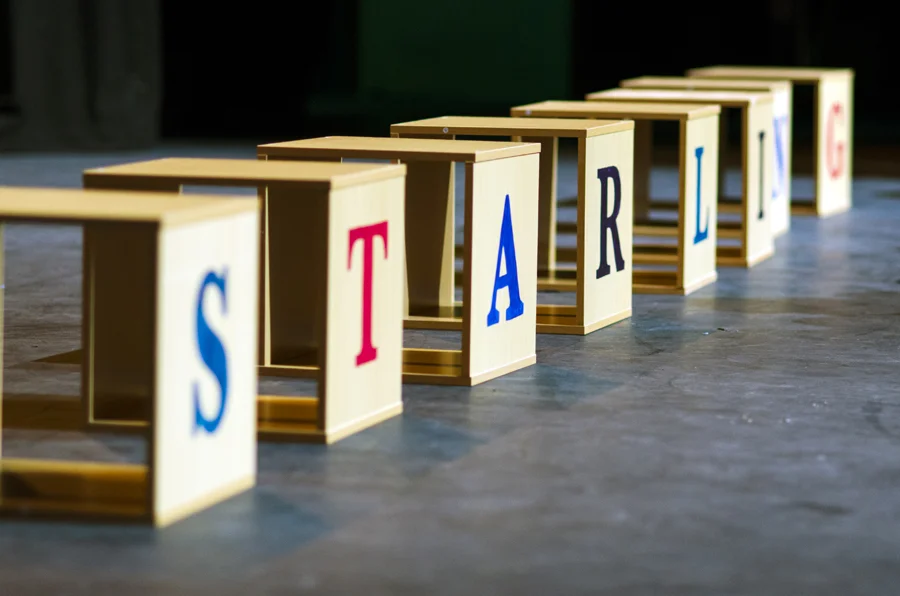Using the Arts in Education and the Community
/We've had an inspiring day at this year's TheatreCraft, the 'behind the scenes' careers day for young people, held at the beautiful Royal Opera House.
The Starling Team led a workshop all about using the arts in education and the community, and following on from this, we're sharing below 10 of our key approaches to running arts sessions. Do you agree? What would you add to the list? Let us know your thoughts by leaving a comment or tweeting us @StarlingArts!
1. Set up the space
Workshops often go on in unexpected spaces - so be prepared to make the most out of any given venue - whether you're put in a corridor, barn or playground. Try to make your space as bright, airy and open as possible. Clear away any unnecessary clutter or furniture safely, and make sure you know where you want the group (and their belongings!) to go when they arrive. Check for trip hazards like wires, bags or boxes. Position yourself so you can see the whole room and the door so you can monitor any late-comers or early-leavers.
2. Set the tone
Your behaviour will affect everything, from energy levels to interactions between the group. Always be positive and open - whatever is going on in your own life. Never ask people to do something you wouldn’t do, so be fearless! Go for everything full pelt, be it a warm up game or fully staged performance: your group should follow your lead. Never be embarrassed by being over the top when giving examples!
3. Treat everyone as individuals
Learn names, find out what makes people tick and be open to signals from people. Remember that everyone has a life outside of the workshop space and although it is your job to help every participant to engage with the present moment, people can be distracted by unrelated thoughts. You might need to go off plan in order to keep sessions engaging and encourage people to actively contribute their ideas and work together to keep their problems outside the room.
4. Get everyone on the same level before you start
This could be as simple as getting everyone to close their eyes for a moment, and bringing them into the room slowly. Humming the same note or clapping a rhythm that everyone repeats together can also be effective.
5. Make sure everyone has a connection
For some people, group settings can be extremely daunting. First introduce people in pairs, and allow them to find common ground. Ask the pairs to introduce each other instead of themselves, taking some of the pressure off - talking about ourselves can be hard! That bond will put everyone at ease, and that confidence boost should allow everyone to work on a much better level for the remainder of the session.
6. Circle time
Ever wondered why drama or performance sessions usually start with a circle? Circles put us all on one level, and mean we have greatest chance of seeing everyone in the room at once. Circles make it easier for us to share, communicate and collaborate.
7. Call to silence
Performance exercises can often be very noisy, making bringing people back together tricky. Create a ‘Call for Silence’ the group has decided on themselves that relates to your workshops’ subject matter. For example, when working on a production of the Ugly Duckling musical Honk!, our participants came up with the call: ‘Give us a honk - “Honk!”’, a simple call & response we could call out whenever we needed their attention. It’s important to make sure your participants do something physical or vocal (like the response) to show you they're ready.
8. Warm-ups work
Warm-ups bring everyone into the same place physically and emotionally. People arrive at workshops from different places and in different moods - some straight from school, work or home. Warm-ups do just what they say: prepare everybody for the challenges of the workshop and put everyone on the same page.
9. Be prepared to change your plan
You might have an exciting, energising session planned, but turn up to find the group already over-hyper and in need of calming down. Try and judge the mood continuously through your session, and be prepared to go with your gut if you feel things need shaking up!
10. Focus is your best friend
Of course drama, or any kind of participation, should be fun, and high energy is important. But one of your most important goals is creating focus so the dynamic of the room can be more easily managed. There are lots of useful games and techniques for doing this - try counting games and breathing exercises.
Of course, these are just a few ideas that influence how we work at Starling Arts, but are hopefully a good starting point if you run or are thinking about running workshops with young people and/or in communities. Let us know your thoughts!
Follow us on Facebook and Twitter and joint the conversation @StarlingArts


